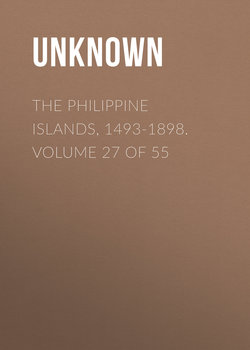Читать книгу The Philippine Islands, 1493-1898. Volume 27 of 55 - Unknown - Страница 18
На сайте Литреса книга снята с продажи.
Grau y Monfalcon’s Informatory Memorial of 1637
Number 11. First reason of the importance of the islands: their discovery
ОглавлениеThe first reason for which the Filipinas should be valued is that of their discovery, which was made by Hernando de Magallanes in the year of 1519, after so many hardships, by the new navigation through the strait until then undiscovered, to which he gave his name. That expedition was not for the discovery of lands or wealth, as were others, but to obey the order and satisfy the desire of the emperor Carlos V, of glorious memory—who, years before, had made known this desire and endeavored to carry it into effect; and at that time he succeeded in doing so, by making the agreement for that heroic voyage, which astonished and encompassed the world. It is to be noted that that discovery was directed toward the islands of Maluco, so that the crown of Castilla, which was then separate from that of Portugal, might enjoy for itself alone the trade in the spices that grow there. That was obtained, and the vassals of both crowns having fought together for the conservation of those islands, their weapons were reduced to pens, and to various councils and disputes as to the situation and demarcation of the islands. Although it was recognized that they belonged to Castilla, according to the division of the world made by the apostolic see—as it then had no other lands or islands near those of Maluco, from which to succor them, except Nueva España which is so distant—yet, as it was judged difficult to maintain them, in a region so remote, against the invasions of Moros10 and pagans, and against the obstinacy of the Portuguese (who could never be persuaded that those islands were not theirs); and seeing that the action of abandoning them was unworthy of him who had spent so great a sum in their discovery, and in planting therein the gospel: it was accepted as a more creditable and expedient resolution to dispose of them in pledge11 to the crown of Portugal. That country held and maintained them alone, until the year 1564, when the Castilians, under the command of Adelantado Miguel Lopez de Legazpi, continuing what Magallanes had commenced, went to settle the Filipinas Islands, by the proximity and protection of which they recovered the islands of Maluco; and more, when these two crowns had been united, was the mutual aiding of their vassals facilitated. In order to assure their defense, by the agreement of both countries (the circumstances of the transfer having become almost obscured) the Malucos were detached from the crown of Portugal and joined to that of Castilla; and they became subject, as today, to the Filipinas. Consequently, the argument with which the author of the History of the Malucas affirms that if God had permitted the king of that time to exclude the Filipinas from his monarchy, leaving them exposed to the power who should first occupy them, Maluco would have so bettered the condition of its affairs that it would have been impregnable, is not very clear. That statement must be understood with reference to the Moro kings, who would have been more powerful had not the proximity of the Filipinas subjected them; since it is evident that, if when the emperor disposed of the one [group of islands], the others had been settled, he would not have made that bargain, but would have defended them and kept them all. That is verified, because when Felipe II, having succeeded to the crown of Portugal, wrote to the governor of Filipinas to reënforce the Malucas and other places in India whenever he had an opportunity, that was a matter of so great fear to their kings that the king of Terrenate, Sultan Babu, feeling himself oppressed by a greater and nearer force, sought defense in peace, and to secure it sent, as ambassador to these kingdoms, Cachil Nayque. From the above it is inferred that, if the first intent was to discover the Malucos because of the wealth of their trade—which is now united with that of the Filipinas, as will be seen; [In the margin: “In number 29.”] and if the maintenance of the one group consisted in that of the others, even when they belonged to different crowns: now that they all belong to Castilla, more necessary is the conservation of the Filipinas, in order that the islands of the Malucos may not decrease from what they were then.
10
The progress made by the Mahometans in the eastern part of Asia was very slow. The inhabitants of Malacca were converted in 1276, those of the Moluccas in 1465, and those of Java in 1478, and those of the Celebes one year before Vasco da Gama rounded the cape of Good Hope. Nevertheless, after 1521, many of the inhabitants of these islands began to be converted to Catholicism.—See Doc. inéd. Amér. y Oceanía, vi, p. 375, note.
11
Empeño: This transfer, as may be seen from the treaty of Zaragoza (vol. 1, pp. 221–239), was part of the sale by Spain to Portugal of the spice-trade, right of navigation, and islands then in dispute between the two crowns; but various stipulations were made regarding it, so that the Maluco Islands were, in a sense, held as a pledge for the observance thereof.
